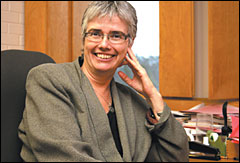Next: Routine findings
Posted Jan. 11/07
A 70-year-old woman wakes up short of breath, sweating and with pain in her jaw. Since her symptoms don’t match the classic signs of a heart attack, she waits an hour before calling an ambulance.
Studies show that women are less likely than men to believe they’re having a heart attack and more likely to delay seeking emergency treatment. The Canadian Institute for Health Information found that within 30 days of a heart attack, women are 16 per cent more likely to die than their male counterparts. They are also less likely to get rehabilitation care.
What’s going on here?

- The Law Society of Upper Canada presented an honorary Doctor of Laws to Diana Majury in July 2006 for her dedicated efforts to achieve her vision of equity, rights and health of women. Majury’s key research areas are both varied — criminal and family law and human rights — and specific — women’s health, feminist legal theory, sex equality theory and violence against women. (Photo: Chris Strangemore)
“Historically, the assumption has been that whatever works for men works for women,” says Diana Majury, associate professor in the Department of Law. “Now people are recognizing that virtually all health issues have a gender difference — women and men may have different prevalence of disease, diseases might take a different course, women may be treated differently or respond differently to treatment, and models of disease may have been developed from studies with male subjects.”
“What’s needed is a way to uncover the differences and then to take action so the health care system is responsive to women,” she says.
In Ontario, the provincial government is creating a women’s health institute that proposes to push the boundaries on how gender, sex and women’s health are thought about and to move innovative thinking into practice for the benefit of the health of Ontario women and, by extension, all Ontarians.
Majury, who has been active in women’s health issues since she began teaching in the late 1970s, was appointed to create a long-term vision for the women’s health institute in August 2005. Her recommendations, including naming the institute ECHO, are now before the Minister of Health and Long-term Care.
“I met with about 450 people across the province — in interviews, focus groups and consultations — asking ‘What’s needed in women’s health?’” says Majury. “There was surprising agreement from policy makers, researchers, women’s and community groups and health associations that lots of exciting work was being done, but done in silos, and that the institute was needed to bring groups together, move research forward and bring it to the policy stage.”
Using the increasing base of research that can contribute to improving the understanding of women’s health problems, needs and utilization patterns across Ontario, ECHO’s envisioned role is to integrate findings and policy to reduce the burden of illness, reduce rates of morbidity and mortality, and reduce inequities in health status.
At the heart of reducing inequity is a health determinants approach that takes genetics, gender, economics, education, physical environment and the like into consideration. The work on developing effective models for applying a health determinants approach is in its infancy, according to Majury, so ECHO would fill the gap by developing and disseminating health determinants frameworks and models that are specifically focused on women’s health.
Another important role will be to establish the big picture of women’s health in Ontario. An ongoing information-gathering project will determine the current status of health and identify gaps to inform future decisions on ECHO’s areas of focus.
If Majury’s recommendations are accepted, when it opens in spring 2007, ECHO’s initial projects will concentrate on mental health, sexuality and reproduction, and chronic disease, particularly cardiovascular.
From its location in the Women’s College Hospital in Toronto, ECHO will benefit from access to researchers and front-line clinicians while having a distinct mandate and independent governance. In championing women’s health, ECHO will develop networks for knowledge exchange, synthesize and leverage research, and enhance the capacity for policy and applied research.
Majury, who will withdraw from the project as the Board of Directors is set up and the business plan is fleshed out, expects to experience empty nest syndrome after dedicating 18 months to the project.
“Being involved in a project like this is very energizing despite the long hours,” she says. “I saw and learned a lot, and the consultations with people across the province were a real highlight.”
“There is a lot of excitement and energy around this initiative, and also high expectations,” says Majury. “Ultimately the institute should make itself obsolete by thoroughly integrating gender into all health matters.”